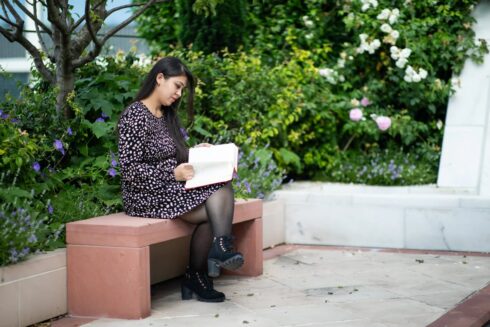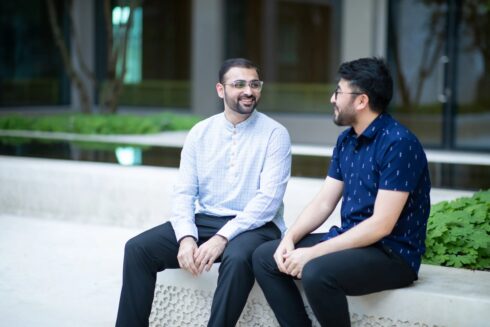Graduate Programme in Islamic Studies and Humanities
-
Status
Closed -
Date
16 Sep 2024 -
Location
London -
Apply by
13 Jan 2025
The MA in Islamic Studies and Humanities trains students to use the intellectual tools of the humanities and social sciences and to explore perspectives which relate religious ideas to broader dimensions of society and culture.
Islam’s civilisational achievements are studied at the same time as its theological and religious expressions across time. Taking an interdisciplinary approach to studying Islamic history and thought, special attention is paid to issues of modernity that arise as Muslims relate their heritage to contemporary circumstances, all of which contributes to an enriched academic curriculum.
In the context of Muslim societies, GPISH is informed by the full range and diversity of cultures in which Islam is practised today, from the Middle East, Southern and Central Asia, and Africa to the industrialised societies of the West, taking into consideration the variety of contexts which shape the beliefs, practices and ideals of the faith. GPISH highlights and promotes research areas which have had relatively little attention devoted to them. These include the intellectual and literary expressions of Shiʿism in general and Ismailism in particular.
GPISH is a fully funded scholarship programme which covers the cost of tuition fees and includes a living allowance in line with the UK Visas and Immigration’s stated cost of living. For further information, please see the UK Visas and Immigration website.
The principles outlined here inform all the intellectual programmes of the IIS, including the two graduate programmes of study, as well as research, seminars or conferences, and public lectures. GPISH, in particular, reflects a basic re-assessment of conventional academic programmes in this field. Essentially, it seeks to integrate areas and methodologies that have become separated in many existing programmes. The philosophy of GPISH also reflects the premises guiding the IIS’ intellectual activities as a whole. Among the levels on which integration as well as new perspectives are intended, the following are noteworthy.
GPISH seeks to avoid a division of pertinent disciplines – e.g. history, anthropology, political science, philosophical analysis, linguistic and literary criticism – in the study of Muslim societies. It aims to do more than merely encourage cross-references between them. Its objective is rather to promote an approach in which the disciplines are intertwined at their roots, to produce an integrated analysis of the subject, conceived as broadly as possible.
Behind this approach to methods of study there lies a specific approach to the subject matter too. The premise here is that “Islam” can more fruitfully be treated as a civilisation rather than a religion only. This premise has implications for the treatment of the subject matter. Instead of conventional divisions such as theology, law and mysticism, representing distinct religious interpretations of Islam, the programme treats these and other issues in the common framework of a cultural history. This means, f irst, that religious developments will be seen as part of the development of thought and culture in Muslim societies. Second, those aspects of culture (like art, poetry and architecture), which are not always treated on a par with doctrine, law or religious practice, will be so regarded. Third, as culture cannot be studied in isolation from society, the programme will treat this inter-relationship of ideas and meanings to social and political forces as one of the keys to an integrated understanding of the subject matter.
If the inter-relationship of cultural factors to socio-political ones is of importance, it means that the diverse definitions and schools of thought which emerged in Islam must be understood historically. The division of Islam into its existing sects and schools was not always a neat or hard-andfast phenomenon in all periods of history. The number and boundaries of the groups tended to fluctuate with time and place. GPISH will show the emergent character of these divisions, rather than assuming them as a given fact. Similarly, assumptions (even where these are implicit rather than explicit) like “orthodoxy” and “heterodoxy” have a strong influence on the way in which Islam is understood. Again, the historically based approach will seek to understand how and where these or similar concepts were arrived at, rather than taking them as given.
An historical approach to Islam must be balanced by a due appreciation of the meaning religious ideas have for their followers, and the centrality of spiritual and ethical aspirations in their lives. GPISH therefore gives due attention to the role of poetic and imaginative discourse in the shaping of spiritual life in Muslim cultures.
While the approach to Islam as a civilisation is intended to integrate as well as enlarge both the subject matter and angles of study, this does not preclude an appreciation of the enormous diversity of Muslim societies. One of the objectives is to re-examine all explicit and implicit descriptions of Islam as a monolithic phenomenon. It will examine the dialectic of cultures whereby a variety of older, existing traditions were assimilated, transformed and synthesised, in most areas, into regional expressions of Islam. The diversity of these expressions must be noted without normative preconceptions about their validity. Students will study the diverse features of Islamic culture in such significant areas as the Middle East, South-east Asia, the Indian subcontinent and Africa south of the Sahara, without assuming such distinctions as that between “peripheral” and “central” Islamic lands. Similarly, the programme will examine the important role of not only “classical” languages (Arabic and Persian) but also national, regional or local vernaculars in the evolution of Islamic sensibilities. The one-sided emphasis, in many scholarly accounts, on “learned” or textual Islam to the relative neglect of “popular” and oral traditions, is balanced through considering the validity of these varying expressions in their respective contexts. Avoiding exclusive concentration on doctrinal and intellectual formulations by paying full attention to the practical manifestation of Islamic ideals in living societies is therefore significant. Anthropology will therefore have a central place as a tool of analysis alongside the “classical” disciplines of philology, history and the like. However, the insights of anthropology will be marshalled widely in the study of the civilisation as a whole. This will enable anthropological analysis to range well beyond its traditional concentration on local rather than national and international societies and cultures.
Despite recent attempts to link the two, there is a persisting tendency for research into the past to proceed along separate lines from the study of contemporary Muslim societies. This is in part reinforced by academic departmentalisation, whereby those trained in economics, sociology and politics tend to focus on contemporary developments, to the relative neglect of religious and historical topics, and vice versa. The intellectual framework of this programme is designed to bridge this gap. It assumes that spiritual or existential issues are as relevant to contemporary Muslim societies as they were in history. The study of the vast changes introduced in these societies in the modern period will pay attention to the meaning and images of the past which are current in these societies. It will focus as much on the spiritual implications of social change as on the reverse relationship, both in history and contemporary life.
The polarity of “Islam” and the “West” assumed in much contemporary discourse about the subject needs to be subjected to critical analysis. GPISH, in addition to parallel research, public lectures and publications, will examine the origins, logic and political and cultural consequences of this categorisation. The overlap between some of the more fundamental issues of society and culture today across Western and non-Western lands, or across the developed and developing worlds, needs to be noted without the distortions inherent in too facile an opposition between the “West” and “non-West”.
Entry Requirements
- A UK 1st or 2nd Class Honours Degree (2:1 preferred) or recognised equivalent
- English language proficiency
See Entry Requirements page for full details.
Everything you need to know to apply to GPISH
Visit GPISH admissions page
Testimonials
Inaara Karmali
GPISH, 2024 - Kenya
My GPISH journey has been an unparalleled opportunity, deeply influencing my personal and academic growth. By immersing myself in the dynamics of Muslim societies, GPISH has enabled profound self-discovery within our diverse JamatAssembly or religious congregation; also a term used by the Nizari Ismailis for their individual communities., alongside rigorous academic preparation for future endeavours.
Muhammad Salim
GPISH 2024 - Pakistan
Being a part of GPISH, as an international student, has been a life changing experience. From learning a new language to engagement with critical ideas, GPISH has significantly contributed to my personal and intellectual growth. This experience not only equipped me with invaluable knowledge but also instilled in me a deeper sense of societal responsibility.









